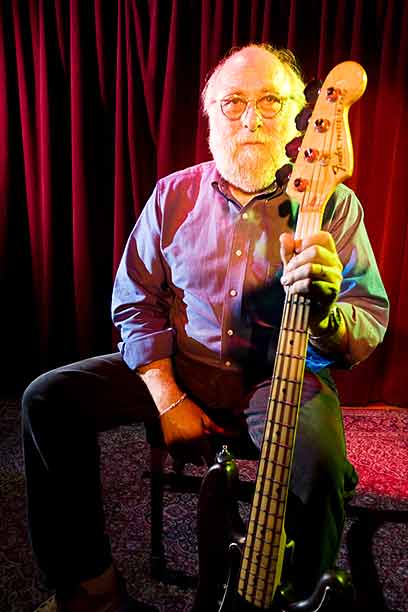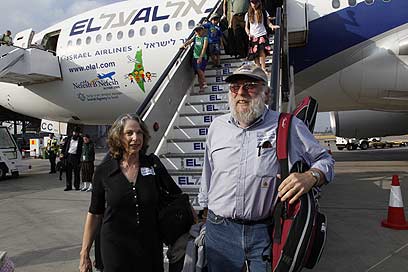
American bassist makes aliyah: My mission is to bring musicians to Israel
After playing with Bob Dylan, Hendrix and Joplin, after drowning in a sea of sex and drugs, American bassist Harvey Brooks reconnects with his Jewish roots and makes aliyah to become part of Israel’s music scene. Now he just hopes that Ehud Banai has some time for him
When the ElAl Boeing 777 landed in Ben Gurion airport, a passenger in row 13 joined the other passengers in singing “Heveinu Shalom Aleichem” as he wiped away a tear. The folksong was completely different from the usual repertoire of the sweet man with the white beard and John Lennon glasses.
For 40 years he has played alongside his close friends Bob Dylan, Jim Morrison, Jimi Hendrix, Janis Joplin, Miles Davis, Mama Cass, BB King and many more. This new style of song didn’t bother him at all. “I am so excited, I have come home!” said Harvey Brooks, one of the most sought after bassists in the American rock scene of the sixties and seventies.

Harvey Brooks (Photo: Shahar Azran)
Seconds after the airplane doors opened and Brooks walked out with his wife Bonnie, Bonnie’s daughter Lori ran over to greet them with her nine children. Lori, a baal teshuva, made aliyah years ago. “If you would have told me more than twenty years ago, back when Judaism didn’t interest me at all, that this would happen I would have just laughed at you or gotten high,” says Brooks peacefully.
Until twenty years ago, Brooks kept his Judaism stored far away. The smoky clubs of Greenwich Village were the places that reminded him most of home. Brooks was born 66 years ago as Harvey Goldstein. His father Samuel worked as a truck driver. His mother Fay was careful about commemorating the Jewish holidays and lit candles for Shabbat, but young Harvey preferred playing guitar to attending synagogue.
He began playing at 15 and quickly switched to bass guitar. Al Kooper, a close musical friend introduced him to Dylan. “Dylan’s band had trouble with the bass player and Kooper said to me ‘How about playing with Bob Dylan?’ I didn’t know who he was at the time, but it worked out great,” Brooks recalls.
“Dylan could be sweet, polite, considerate, but also pretty sarcastic and cynical. It is important to him that he be clearly understood, so he gets into details, but when people ask him stupid questions he can be sarcastic and cynical. There are people warmer than him, but Dylan is Dylan and he can get away with just about anything. He is a ship without a port, he loves his music and follows it around. That is really what is important to him, nothing can separate him from his music, not even family. He gave up on lots of family matters for his music. We used to play chess. He was a good player, but to the best of my recollection, I beat him a few times.”
Did you realize that you were playing alongside one of the greatest musicians of recent history?
“At first it was just another opportunity to play music, but I quickly understood that he is a phenomenon, a genius. Dylan is one of the great musicians I have played with, and as the years passed I realized more and more just how great he is.”
When did you last get together?
“I haven’t seen him for 13 years, but I am in close touch with his manager.”
'Success killed them'
Two days before boarding a plane to fly to his new home in Jerusalem, Brooks returned to the clubs in Greenwich Village where he used to play his music and drink and smoke anything he could get his hands on. Most of those clubs, it seems, are now shut down. The last twenty peaceful years in Arizona have not caused Brooks to forget those crazy times.
“This is where the ‘Cafe Au Go Go’ club used to be, here was ‘Figaro’” Brooks explains, pointing to boarded up doors. “Its like coming back home and finding nobody there waiting for you, no Mom and Dad. There used to be lots of clubs here, now there are much less. We used to finish playing and go out to drink and party. We could sit around, talking and drinking until the morning, then sleep until the afternoon. Nobody would bother us. Nowadays, after an hour the waiters and bartenders ask you to leave, its all about money.”
Its four in the afternoon, the sun is blazing, and Brooks is overcome with memories. “I really miss Jimi Hendrix. Women loved him, and not only women. He knew how to drive his audience crazy. I met him at his first festival, we were in the same hotel for a few days, some of the most beautiful women in the world were there and they all wanted him.
Before our last shows I was making mixes in the studio and Hendrix was in the next room. We talked about doing something together with Miles Davis, and Jimi was complaining about his managers. ‘Harvey, they are just killing me, they want me to do a bunch of shows, and I just don’t want to. I want to sit quietly and write music, and not work so hard, but my manager says I have to go do tours for the money,’ he said to me. So I told him ‘Jimi, you don’t owe them anything, you just look out for yourself.’ But he said ‘Harvey, too many people are dependent on me and my music,’ and he went out on tour. He was a human being but they treated him like a machine. I certainly blame his managers for his death.
“Jim Morrison, like Jimi, died because of the music industry. Success killed them, they lost their grip on reality, they were overcome. Freedom is a good thing, but it has to be under control. Jimi, Janis Joplin and Jim Morrison all needed a good doctor or a serious psychiatrist, not drugs and alcohol, to solve their problems. But they had nobody to help them. Nobody really cared about them. They lived in a time when the monstrosity of the music industry was killing its best and brightest. Morrison would go completely crazy sometimes from drugs and there was nothing to do but to wait for it to pass. When he wasn’t on drugs he was a very nice guy, even charming, but the drugs were stronger than him. When he was under the influence of drugs he was scary sometimes.
"Lots of the musicians were like that. I played with Mama Cass Elliot from the Mamas and the Papas and sadly I saw her friends giving her lots of drugs. She would show up to a performance and her voice was shot, completely gone, and she was a great singer. I also loved Janis Joplin a lot; she was a great singer and a fantastic person.”
Did you also love her as a man?
No, just as a friend. I could not touch her. She had no boundaries, she was sexually wild, and you have to be careful of that. She was bisexual and loved sex. In her performances she gave her all, all the wildness and all the power. What you saw was what she really was, no masks. She also knew how to drink. We would have drinking contests to see who could drink most and Janis would win big. She would drink and drink. Me too, I never came in last in these contests, maybe third, but Janis almost always won.”
Brooks also played with The Doors, in their shows and also on their albums. When recording the song “Touch Me” he also functioned as psychologist, kindergarten teacher, social worker, and producer. “The band members were fighting and almost didn’t speak to each other. Each one of them brought his part and I put them together into one song. We worked in a studio in Los Angeles and sometimes they showed up and sometimes they didn’t. If I wasn’t there the song would have never gotten made. After all this Morrison came in and sang the lyrics. Once he came in with two or three girls all over him, it was amazing, he had great charisma.”
When remembering B.B. King, a smile spreads across Brooks’ face. “He was the warmest and greatest person that I ever met. He’s one of the greatest blues players of all time, and an exciting musician. Many were inspired by him, imitated him, stole from his music. At one of his shows we were backstage drinking beer, talking about music and life. Suddenly a beautiful woman walks by, someone that King did not know. He says to her, with his charm, ‘Come her baby, come sit down’, then he says to me ‘Excuse me, but I have to talk to this lady.’ He bought her a beer, put his arm around her and took her into the next room. He said to me ‘Harvey, I’ll be back in a minute.’ Ten minutes passed, then fifteen, then I understood that I was only going to see him again after the show. He was full of charm, women were as important to him as music.”
'I didn’t want to kill myself'
It wasn’t only Brooks’ friends who tried every drug imaginable, he did it too. “But thankfully I wasn’t enough of a celebrity, I helped make music but I was never the center of attention. That’s why the monster didn’t kill me too, otherwise I would have ended up like them. When I was in San Francisco, Peter Fonda came to where I was living and asked me to do the soundtrack for the movie ‘Trip’, a completely psychedelic film. We went to a huge Hollywood mansion, every night girls showed up. That was during the ‘Free Love’ era, what ever you wanted you got, sometimes five girls a night.”
What drugs did you try?
“All kinds of drugs, LSD, cocaine, everything except heroin. I never touched heroin, even though people offered it to me. I guess that’s my survival instinct. I didn’t want to kill myself, I didn’t want to be out of control. If I would not have stopped with the drugs I could have died like many of my friends.”
But many great musical works were written under the influence of drugs.
“With drugs you make good music only for an audience on drugs. Drugs can open up your imagination and take you to places you wouldn’t otherwise go, but only if you are very talented. Lots of people tried drugs in order to create music because they didn’t have enough talent but drugs can’t make talent. They just impair your mind. Today I make better music and I control my playing better than when I was using drugs. I have more inspiration, too. Drugs and alcohol just castrate you.”
It was Bonnie, his wife of the past 20 years, who rescued him from all that. “Without her I would be dead, finished. I was a 46 year old bachelor, on drugs and alcohol, and she was a divorcee with three great girls. When I fell in love with her she told me ‘I have three daughters, if you want to be their stepfather you have to stop with the drinking and drugs. Otherwise you don’t have a chance with me.’ I stopped all that, I am really lucky.”
Why didn’t you get married earlier?
“It was just not possible. I was selfish, an egotist. All I cared about was music. Now I am also involved in music, but I also understand people. When I used to play with my group I would say, ‘We have rehearsal tomorrow at one, be there!’ and when someone would say, ‘I have to ask my wife, maybe I have to watch the kids,’ I would say, ‘What are you, a woman? A wimp?’ I didn’t understand what it is to have a family and to be responsible. When you have people that you love and feel responsible for your priorities change.”
Do you regret not having kids of your own?
“Bonnie’s kids and grandkids are my kids and grandkids. I am the only father and grandfather that they have here. That is enough for me.”
From Carlebach to Ehud Banai Bonnie got Brooks into family life and into Judaism as well. “Bonnie made Judaism an important part of my life, and thanks to her aliyah seems natural to me. Israel is the right place for me to spend my remaining years. It is a wonderful land with so much inspiration, just beginning to develop.”
For the last twenty years, Brooks has been teaching music and producing for local musicians where he lived, Tucson, Arizona. It was there that he made contact with Nefesh B’Nefesh, and they are currently helping him and his wife acclimate to Israel, as they have helped thousands before.

New in Israel: Brooks with wife, Bonnie (Photo: Sasson Tiram)
Bob Dylan’s trips to Israel and your conversations with him never connected you to Israel?
“Not the way I am connected now. When Dylan came back from one of his trips to Israel, he was sitting in a room, wearing this black hat, telling how Israel is great, but then he had periods when he got close to Christianity. Israel became an important part of my life only when Bonnie brought me for my first visit.”
Are you familiar with Jewish or Israeli music?
I grew up in a home where we sang Yiddish songs, and I knew Rabbi Carlebach and Theodore Bikel. Two years ago an IDF musical group came to Tucson and it was very impressive. I know Ehud Banai. Bonnie called him once and he invited us to his show in ‘Zappa’ on one of our previous visits. I couldn’t understand the language, but it was a great concert and Ehud was very nice. I told him maybe we will do something together when I make aliyah. I think he’s a genius, I just hope he has time for me. There are some Dylan songs that I would like to do something with, I’ll try to get Ehud to record them. I don’t want to put pressure on him, but it would be a great combination. I spoke to Dylan’s manager about it and he agrees.”
What else will you do in Israel?
“I plan to play, teach, write my memoirs, and promote our record label 17th Street Records. I would love to get musicians like Bob Dylan and Donald Fagen to play here. Unlike other people, I can talk to them and their managers. Besides being a musician myself, I feel that it is my mission to bring musicians here. That’s what I’m supposed to do.”
Nefesh B’Nefesh: 22,000 Olim in seven years
Nefesh B’Nefesh, a private non-profit organization, was founded seven years ago by Jewish American businessman Tony Gelbart and Rabbi Yehoshua Fass, with the aim of encouraging aliyah to Israel from western countries. The organization, which operates in cooperation with the Jewish Agency and the Government of Israel, has brought over 22,000 new Olim from the USA, Canada and the UK over the past seven years.
Nefesh B’Nefesh provides comprehensive pre and post aliyah guidance and support to immigrants by handling all aspects of their aliyah process, from the planning stage to well beyond their arrival in Israel.
The organization offers financial assistance, employment resources, social services and expedites governmental absorption procedures in order to help make each individual’s aliyah more successful. The successful combination of both support and service has enabled NBN to maintain a 98% oleh retention rate.















